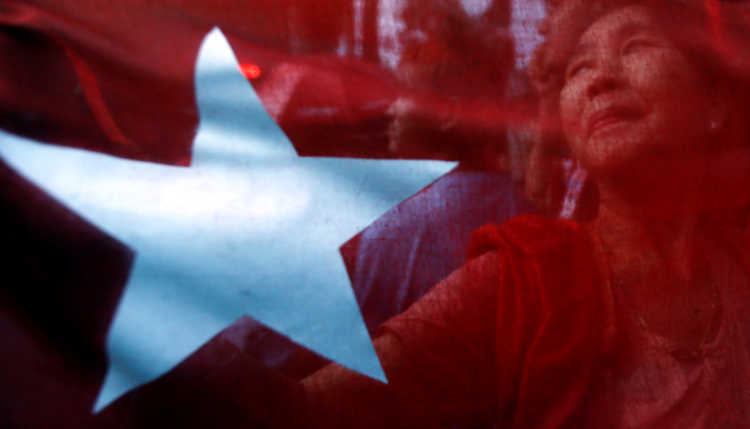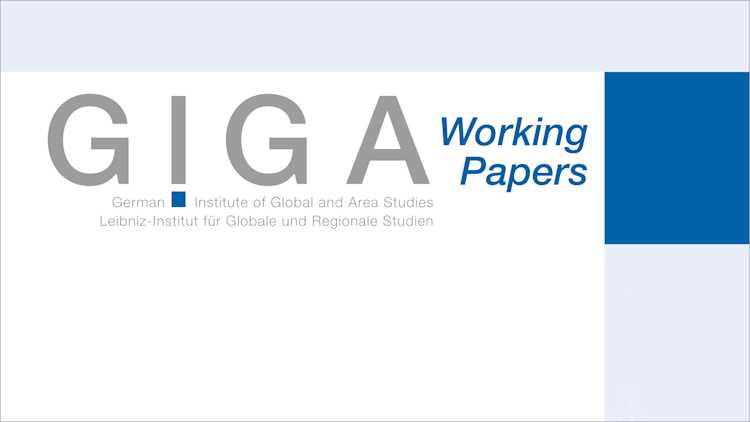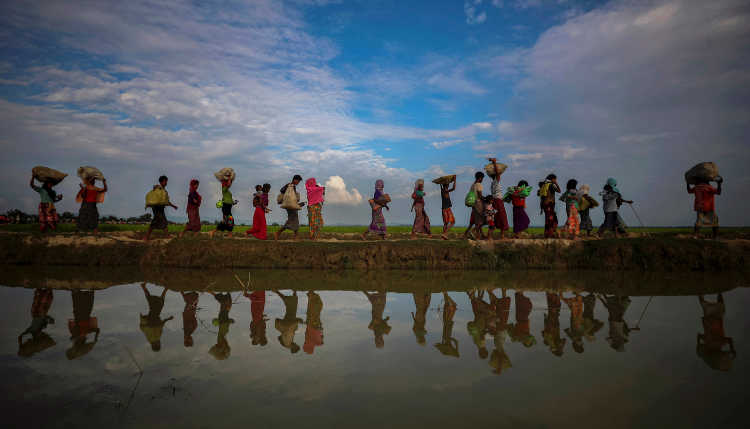- Home
- Publications
- GIGA Focus
- Myanmar’s National League for Democracy at a Crossroads
GIGA Focus Asia
Myanmar’s National League for Democracy at a Crossroads
Number 1 | 2017 | ISSN: 1862-359X

Democratic transition in Myanmar appears to have come to a standstill. Western analysts have focused on the political constraints faced by the National League for Democracy (NLD) under Aung San Suu Kyi. Most refer to the still-excessive power of the military to explain the party’s governance failure. However, a closer look suggests that the NLD is not only unable but is also unwilling to lead according to democratic principles.
Since its re-establishment as a political party in 2011, the NLD has mobilized voters by propagating liberty, equality, and justice – thus fanning the hopes of those longing for an end to authoritarian state policies. Now, over a year after its landslide victory, these hopes are beginning to crumble as the NLD fails to live up to its convictions.
Ethnic minorities have criticised the lack of progress in ensuring their rights in the face of military operations in the north-east and the west of the country. Human rights advocates have condemned Aung San Suu Kyi’s passivity towards the military’s persecution of the Rohingya minority in Rakhine State and the NLD’s downplaying of the conflict.
The media faces increasing intimidation instead of enjoying freedom of speech, while state media channels continue to produce old-style propaganda.
NLD members are worried about the decline of democratic decision-making within the party. They are demanding a more transparent and efficient chain of communication to address urgent concerns and deeper integration of junior party members.
Policy Implications
The NLD’s tacit approval of the military’s actions and its increased disconnection from the democratic values on which it was elected have raised concerns over the party’s will to continue along its chosen path. To support Myanmar’s transition, European decision-makers need to strengthen their relations with the Myanmar government and press for policies that support transparency, accountability, and the protection of human rights. To be successful, policymakers should employ an approach that combines economic cooperation incentives and careful diplomatic counsel.
Democratic Legitimacy at Risk
Under the leadership of Nobel laureate Aung San Suu Kyi, the National League for Democracy (NLD) assumed power in Myanmar on 30 March 2016 after more than a half-century of military rule. The news of the NLD’s landslide victory in the 2015 general elections was celebrated in Myanmar and abroad as a sign of the impending democratisation of the South East Asian nation. Indeed, the NLD has enjoyed iconic status for many years due to its decade-long struggle for free and fair elections and its promise to support key democratic values if elected. The party reiterated this during its election campaign, which focused on internal peace, national reconciliation, the creation of a federal system, amending the constitution, and improving the lives of the people.
Considering the sheer scope of these aims, it is easy to see how the NLD would struggle to translate them into actions. After all, the military still holds 25 per cent of seats in parliament and remains in control of the Ministries of Defence, Home Affairs, and Border Affairs, which operate almost independently from the rest of the government. Moreover, the NLD’s election victory and assumption of power were marred by uncertainty over Aung San Suu Kyi’s role in government since the constitution barred her from becoming president of Myanmar. The NLD did, however, overcome this by creating the role of state counsellor of Myanmar, thus ensuring that Aung San Suu Kyi could serve as leader of the new government – a move that represents the first success of the new government. The government was also able to revoke the 1975 State Protection Act – which had allowed the government to declare a state of emergency, suspend basic citizen rights, and effectively imprison members of the opposition – and the 1950 Emergency Provisions Act, which was similarly used to oppress political dissidents.
Against this backdrop, political successes have generally been few and far between. Few voters and fewer researchers would have expected the NLD to be able to resolve decades-old issues within a year of assuming power. The problem, however, is that many issues have not only been slow to improve, they have actually become significantly worse over the past year.
Although the NLD might not be able to end the deadlock in a highly complex peace process, it could have taken more measures to ensure that ethnic conflicts did not intensify. And while the NLD government would not have been able to veto the military’s persecution of the Rohingya in Rakhine State, it could have eased the plight of the minority significantly by initiating a process that would have reinstated their citizenship rights. The curtailment of the media is worrying too because the NLD acts on its own account and could implement measures that would prevent NLD politicians suing constituents for defamation and grant access to international observers but chooses not to.
Internally, the party has transformed over the last year and has increasingly engaged in top-down decision-making. This governance style is at times reminiscent of the former military-backed regime, which lacked transparency and accountability. The NLD’s approach to dealing with the country’s most pressing issues has started to undermine the NLD government’s legitimacy both domestically and internationally. Thus, after almost a year in power the NLD finds itself at a crossroads. The way the party chooses to govern during its first term will ultimately show whether the NLD is capable of maintaining its image as a champion of democratic values and the party to lead Myanmar to a brighter future. Understanding Myanmar’s ongoing transformation process necessitates a broader understanding of the way the country is governed. It is therefore crucial to differentiate between issues the NLD is unable to resolve due to external constraints and issues the NLD seems unwilling to resolve due to its own convictions. This paper facilitates this broader understanding by exploring the state of ethnic conflicts, freedom of speech, and governance modes inside the ruling party and discussing these aspects in their wider historical contexts.
No Peace in the North-East
Since November 2016, violence has been escalating in the north-eastern states of Kachin and Shan, having an increasing impact on civilian populations. Since early March 2017 more than 20,000 refugees from the Kokang self-administered zone in Shan State have fled to China following violent clashes between the Tadmadaw (Myanmar army) and a number of ethnic minority militias. Yanghee Lee, the special rapporteur on the situation of human rights in Myanmar, claims that there are an estimated 7,000 newly displaced persons in Kachin State, with nearly the entire population of three internally displaced persons (IDP) camps having been relocated for the second or third time (UNHCR 2017: 12). In fact, there were 98,000 IDPs in the states of Kachin and Shan in December 2016 according to the United States Agency for International Development (USAID 2016).
In the north-east, ethnic armed groups have fought the Tatmadaw for decades in their pursuit of self-administration (ideally) within a federal system. Such rights would have been ensured if the historical Panglong Agreement had been enacted. General Aung San, Aung San Suu Kyi’s father and Myanmar independence hero, negotiated the agreement with ethnic leaders in 1947. In fact, the NLD government has modelled its own national reconciliation efforts on the Panglong conference format, launching the 21st Century Panglong Conference, which shall take place every six months (Hlaing Lynn 2017). The first session, held in August 2016, was attended by over 700 participants, of which only 150 represented armed groups. Groups that refused to negotiate – namely, the Arakan Army, the Ta’ang National Liberation Army, and the Myanmar National Democratic Alliance Army – were deliberately excluded from the conference. In this respect, the NLD is continuing the approach of the prior government, which had insisted on the signing of an elaborate ceasefire agreement as a precondition for talks about regional autonomy. As a result, peace talks remain deadlocked.
The NLD appears to be stuck because making concessions along the lines of creating a federal state system would require amending the constitution, which cannot be changed with less than 75 per cent support of parliament. Since the military and the military-backed Union Solidarity and Development Party (USDP) continue to hold 25 per cent and 6.8 per cent of the seats in parliament, respectively, altering the constitution is unlikely to occur in the near future. The NLD therefore needs the support of the ethnic armed groups and the areas they control in order to form an alliance that could create the chance to amend the constitution and, in turn, to grant self-administration rights. Yet, representatives of ethnic armed groups are apparently unwilling to enter into such an alliance and sign a new ceasefire agreement without solid guarantees (Lintner 2017). The NLD government finds itself trapped between the uncompromising positions of the ethnic armed groups, on the one hand, and the Tatmadaw, on the other, and thus unable to make significant progress.
The lack of progress in the peace process is worrying. More worrying still is the situation of humanitarian access in Kachin and Shan States. According to Pierre Peron, a Myanmar-based spokesperson with the United Nations Office for the Coordination of Humanitarian Affairs (UNOCHA), the situation is currently worse than at any point in the past few years (Lewis 2016). Furthermore, the Joint Strategy Team for Humanitarian Response in Kachin and Northern Shan States points out that the continued politicisation of humanitarian relief by the Myanmar government has significantly reduced the chances for humanitarian access on the ground (Joint Strategy Team 2016). The NLD government thus appears to be following in the footsteps of past military and military-backed governments. Not only does this approach not correspond to the NLD’s goal to make Myanmar a fairer and more democratic country that upholds basic human rights, it is also serves to deepen existing divides.
Continued Persecution of the Rohingya in the West
In Rakhine State the Muslim Rohingya minority has been persecuted for decades. The state, however, had seen little involvement by organised armed ethnic minority groups in the conflict until the 9 October 2016 attacks on border police posts by the Arakan Rohingya Salvation Army (ARSA). Formerly known as Harakah al-Yaqin or the Faith Movement, this insurgent group demands – among other things – citizenship rights, access to relief aid, freedom of movement and religion, political representation, education opportunities, the return of property, and the return of Rohingya refugees. About 1.1 million Rohingya Muslims are denied citizenship in Myanmar, effectively restricting their right to free movement and their access to services like education and health care. This denial is based on the discriminatory 1982 Citizenship Law and a historically flawed narrative that denounces the existence of the Rohingya in Rakhine State prior to 1823.
The last wave of violence against the Rohingya minority following the attack of border police posts is not unprecedented but did reflect new levels of cruelty. Since the October 2016 attacks that led to death of nine police officers, the army has been undertaking a clearance operation in Northern Rakhine State. According to Yanghee Lee, the UN special rapporteur on the situation of human rights in Myanmar, this amounts to crimes against humanity. An estimated 24,000 people remain internally displaced in the state, while approximately 69,000 have fled to Bangladesh. Impartial observers have been denied access to the area, but testimonies gathered reported extrajudicial killings; enforced disappearances; arbitrary detention; rape; physical assault; torture; cruel, inhuman, or degrading treatment or punishment; looting and the appropriation of property; the destruction of property; and ethnic and religious discrimination and persecution (OHCHR 2017).
As in Myanmar’s north-eastern states, the NLD has little control over the military. Yet, it is surprising that the party chose to deny all claims of human rights abuses, defend the army’s military operation, and limit humanitarian assistance to the area. In a widely shared social media post from early November 2016 the spokesperson of the state counsellor’s office, Zaw Htay (2016), responded to satellite imagery that showed the remains of burned down villages by writing “Believe it or not! Local Muslim community burned their own village-market down.” In January he posted pictures of burned down villages in Rakhine State in what appeared to be a still picture from an Al Jazeera broadcast with the word “Fake” covering the pictures, claiming that the broadcast had unveiled them as fabricated (State Counsellor Office Information Committee 2017). Al Jazeera, however, had used to pictures as an example of real images of the conflict zone.
Prior to the Tatmadaw’s clearance operation, the government had asked former UN secretary general Kofi Annan to head a commission assessing the tensions in Rakhine State. However, in December 2016 Annan distanced himself from the accounts of grave human rights abuses in the state, telling the BBC that “there are tensions, there has been fighting, but I wouldn’t put it the way some have done” (BBC 2016). Only on 16 March 2017 did he call for the Rohingya to be relocated to Myanmar and the IDP camps to be closed in an interim report by the Advisory Commission on Rakhine State (2017). The NLD was fast to respond, stating that “the large majority of the recommendations will be implemented promptly with a view to maximum effectiveness. The implementation of a few will be contingent upon the situation on the ground but we believe there will be speedy progress” (Ministry of the Office of the State Counsellor 2017).
Yet, the statement all too closely resembled the press release that followed the publication of a UN report on 3 February 2017 which unveiled the extent of alleged human rights abuses. At the time, the government had assured that it would take the allegations very seriously, but it has done nothing to ease the plight of the religious minority.
An investigative commission set up by the NLD and headed by the former military general U Myint Swe repeatedly denied having found evidence of many of the atrocities committed. After the Human Rights Council adopted a resolution on 24 March 2017 to dispatch an independent fact-finding mission to Myanmar, the Myanmar Ministry of Foreign Affairs was quick to dissociate itself from the resolution. The press release stated that “the establishment of an international Fact Finding Mission would do more to inflame, rather than resolve the issues at this time. It is not in accord with the situation on the ground and the national circumstances,” claiming instead that “the government of Myanmar is fully committed to the promotion and protection of human rights” (The Republic of the Union of Myanmar President Office 2017).
It is difficult to see the rationale behind the NLD’s “deny, defend, and dismiss” strategy, which seems reminiscent of former military governments’ attempts to categorically deny and dismiss any allegations about human right abuses in the country. Even without having the means to interfere with the Tatmadaw’s clearance operation, the government could have openly condemned the atrocities and taken a number of measures to improve the general situation of the Rohingya. Such measures should have included granting access for humanitarian actors and independent investigative commissions. This would have facilitated a faster and more effective response to the humanitarian crisis and could have saved lives. Moreover, the government has undertaken no steps to ensure basic rights for the persecuted minority, such as initiating a process to repeal the 1982 Citizenship Law. Rather than being unable to take action, the NLD government seems to have chosen not to take action – which will likely exacerbate tensions in the future.
Declining Freedom of Speech
Besides reconstituting the “deny, defend, and dismiss” narrative, the NLD has also unexpectedly repealed progress made on the issue of freedom of speech in the country. Given the NLD comprises a large number of former political prisoners, many constituents and observers expected the party to end persecution based on repressive laws. Yet, according to the UN, an estimated 170 persons are currently serving prison terms for peacefully exercising their rights to freedom of opinion and expression and of association and assembly.
PEN Myanmar, an organisation that promotes the freedom of expression, says that at least 38 people have been charged with online defamation since the NLD assumed power (McPherson and Win Diamond 2017). Most have been charged under Article 66 (d) of the 2013 Telecommunications Law, which establishes imprisonment of up to three years for actions such as “Extorting, coercing, restraining wrongfully, defaming, disturbing, causing undue influence or threatening to any person using any Telecommunications Network.” In reality the law is used as tool to silence critics of the government. The key issue is that the NLD is not only taking no measures to repeal the 2013 Telecommunications Law, it is also actively using it to silence its critics.
As the Guardian reported, Aung Win Hlaing – an activist and member of the National Democratic Force party (set up by former NLD members who wanted to contest the 2010 elections) – was jailed for nine months in September 2016 for calling President Htin Kyaw an “idiot” and “crazy” in a Facebook post (Lakhdir 2016). Meanwhile, Fiona MacGregor was fired by the Myanmar Times for reporting on sexual violence that occurred during the military’s clearance operation in Rakhine State (Holmes 2016).
The unexpected deterioration of free speech under the NLD also extends to state-owned media. After the Thein Sein government ended prepublication censorship in August 2012, some controversial articles were printed in dailies like the state-run Kyemon. Now, however, such outlets have reverted back to whitewashing coverage of government policy. The English-language The Global New Light of Myanmar responded to the international outcry over the events in Rakhine State with a series of editorials and opinion pieces that called for the removal of the Muslim community from the state. Moreover, the paper argued that foreign journalists and humanitarian actors were working closely with terrorists. In addition, stories about other ethnic conflicts are problematic as they are picked up directly from the military’s Myawaddy news agency (Khaing 2017). It is difficult to measure the negative impact such articles have on the population, but it is easy to see that they are helping to strengthen existing divides. Despite this, the NLD government’s minister for information, Pe Myint, has so far shown no will to put the state media under greater scrutiny. Such unwillingness combined with the active use of repressive laws by NLD policymakers stands in stark contrast to the democratic principles the party ostensibly propagates.
Lack of Trust and Effective Governing Structures inside the NLD
The NLD’s continued centralisation of decision-making powers is reflective of earlier authoritarian governance modes and at odds with the democratic principles it promotes. The major decision-making bodies within the party are supposed to be the 120-member Central Committee (CC) and the 16-member Central Executive Committee (CEC) – the members of the latter are appointed by the party chairperson. However, at the time of writing, the CC had not met for 10 months, and party policymaking was generally being carried out in the CEC. When Aung San Suu Kyi became state counsellor, she could not continue to chair the CEC due to constitutional restrictions. Thus, a secretariat of five senior CEC members was founded to govern the body. Nevertheless, long-term NLD members and parliamentarians agree that the CEC is not well organised. Three members of the CEC secretariat are based in Myanmar’s capital Naypyidaw, while the other two are based at NLD headquarters in Yangon. As a consequence, communication within the CEC is often ineffective and has no functioning mechanisms in place to give instructions to party members.
Decision-making structures were also weakened by the dissolution of policy committees (e.g. on education and health care) following the NLD’s election victory. Many of the committee members and chairpersons became members of parliament. However, instead of appointing new committee members, the NLD chose to dissolve the committees and forego their policy expertise. Consequently, communication within the party has become a major issue and is hampering functionality since CEC members can often not be approached directly and there are no mechanisms for bringing up issues. The problem is intensified by the virtual absence of the CEC members, who mostly focus on supervising members of parliament rather than on the party. Thus, the party has adopted a top-down approach to decision- and policymaking, which has seen transparency and accountability levels decrease.
An obvious answer for why the committees were discontinued and new members were not added to the CEC is that there is a lack of qualified successors. However, this reason has not been confirmed by voices from inside the party. On the contrary, many NLD functionaries believe that there are enough well-qualified and experienced NLD members who could take on such responsibility. Still, these candidates are not trusted by the CEC or other senior members. Many of the CEC members, all of whom are over 65 years old, were persecuted for their political actions by past military or military-backed governments. This might add to their unwillingness to entrust younger party members with such key political responsibilities, particularly those aged between 40 and 60 years old and who have long entered their professional careers. Distributing responsibilities on the basis of age and experience is common practice in Myanmar and not limited to the NLD. The NLD should, however, be a role model and champion the inclusion of the younger generation. After all, doing so would add valuable expertise to the party and would increase the chances of the NLD remaining a strong party once the current leadership retires.
A number of NLD members argue that this is a major problem for the party because it misses out on valuable expertise, especially concerning new technologies and education. The firm belief that party management should be left to senior figures has been reiterated by Aung San Suu Kyi. An anecdote often retold by members of the NLD youth organisation cites a response she made at a NLD youth training camp. When asked why he was participating, one attendee answered that he wanted to assume responsibility in order to change the country for the better. Aung San Suu Kyi replied with a curt “no way.” The problem of delegation and the lack of involvement of those under 60 is a recurring issue in parliament too, where committee posts are almost never given to those below 60 and all chairpersons are over 65. Consequently, many NLD members feel left out of the political process (author’s interviews, September 2016).
They are also worried about the policy focus of the party, which rests almost entirely on the peace process. Many realise that the peace process will likely remain unsuccessful without amending the constitution. However, they also recognise that the military is unlikely to allow the constitution to be altered any time soon. Members are worried about the NLD gambling away its political capital by focusing on a single issue (that they deem impossible to resolve) while giving too little attention to economic and education policies (a point raised multiple times during interviews with NLD members for this paper).
A functioning party structure that promotes the participation of its members is crucial for effective leadership. Transparency and accountability are integral parts of a democratic government. The NLD is currently operating below its potential in both effectiveness and democratic approach to governance. Here, the NLD is not constrained by external forces; it is able to swiftly implement changes if such changes are needed. A stable democratic transition necessitates an effective governing party that adheres to democratic principles. So far, however, the NLD seems to be unwilling to transform itself.
Navigating the Crossroads
The NLD’s unwillingness to unequivocally pursue the country’s democratic transition is likely motivated by a strategy that takes into account the current division of power in the country. National reconciliation is the NLD’s focus because succeeding in that undertaking would put the party in a stronger position to change the constitution. So in the meantime, the party seemingly believes that it is best to adopt policies that are least likely to cause rifts with the military. Hence, it is keeping in line with the former government’s approach of declining any concessions to armed ethnic groups prior to a nationwide ceasefire agreement. The same line of thinking may also explain why they are downplaying human rights abuses and why the party leadership seems to believe that tight-knit decision-making structures are most effective for coordinating policy during the volatile transition period.
Yet, this ambiguous strategy is a dangerous gamble because it is leading the NLD astray from the democratic principles on which it was elected: the protection of human rights and ethnic minorities in the name of equality, the implementation of democratic decision-making structures that ensure accountability and transparency, and equal attention to the wide array of policy areas necessary for increasing prosperity.
Governing Myanmar democratically and resolving the most pressing policy issues is a difficult task, and nobody should expect miracles to happen overnight. European policymakers should, however, strive to address the prevailing issues in the country as a part of their increased cooperation with Myanmar following the lifting of most sanctions in 2013. In doing so, they should differentiate between those issues that call for decisive pressure based on international agreements that Myanmar’s new government has signed or should feel obliged to adhere to and those that require careful consultation and capacity support.
The former includes the need for increased humanitarian access in Kachin, Shan, and Rakhine States as well as access for objective investigators and the media. Moreover, it must entail pressure to repeal repressive laws and a call to end the persecution of journalists and critics of the government. The consultation-based approach should include broader governance questions such as the way the NLD rules. In this regard foreign policymakers cannot make demands; nevertheless, they should offer their expertise and support.
Increased cooperation along these lines will only be possible if European policymakers are willing to make two commitments. First, they need to understand that European economic undertakings in Myanmar are not merely means through which to secure profits in the world’s fastest growing economy, but rather are incentives which can be used to bring about positive change. Second, they need to make an increased effort to understand the historical, political, and cultural processes that shape Myanmar today. Too often issues are perceived within the limited time frame of a mandate, leading to insufficiently context-sensitive understandings of the dynamics that shape political processes. In particular, the persecution of the Rohingya is often viewed as a recent development that followed the violent clashes in 2012, overlooking the fact that the present conflict, which has turned into one of the most disruptive ethnic conflicts in South East Asia (Medha 2016), is the outcome of a decades-long systematic undertaking to drive the Rohingya out of Rakhine.
Myanmar and the NLD are at a historic crossroads. Yet, there are many promising prospects for feasible change that would strengthen democratic values like equality, justice, and the rights of ethnic minorities. These include the repeal of repressive and discriminatory laws, closer cooperation with international actors on humanitarian issues, and the restructuring of the NLD to ensure transparency and accountability. European policymakers need to assist the Myanmar government to identify these prospects and implement the changes needed.
Footnotes
Advisory Commission on Rakhine State (2017), Interim Report and Recommendations, Advisory Commission on Rakhine State, www.rakhinecommission.org/app/uploads/2017/03/Advisory-Commission-Interim-Report.pdf (20 March 2017).
BBC Asia (2016), Kofi Annan Downplays Claims of Myanmar Genocide, www.bbc.com/news/world-asia-38223055 (7 March 2017).
Hlaing Lynn, Nyan (2017), Panglong Conference Likely Delayed to March, Says Govt, in: Frontier Myanmar, http://frontiermyanmar.net/en/panglong-conference-likely-delayed-to-march-says-govt (9 March 2017).
Holmes, Oliver (2016), Myanmar Journalist Says She Was Fired over Story on Military Rape Allegations, in: The Guardian, www.theguardian.com/world/2016/nov/04/myanmar-times-journalist-fired-fiona-macgregor (16 March 2017).
Joint Strategy Team (2016), Urgent Requests: Concerns and Requests Related to the Humanitarian Situation in Kachin and Northern Shan States, Myanmar, in: Progressive Voice of Myanmar, http://progressivevoicemyanmar.org/wp-content/uploads/2016/10/JST-Humanitarian-Situation-.pdf (9 March 2017).
Khaing, Htun (2017), The NLD’s New Chapter in Propaganda, in: Frontier Myanmar, http://frontiermyanmar.net/en/the-nlds-new-chapter-in-propaganda (31 March 2017).
Lakhdir, Linda (2016), Freedom of Speech Remains Illusory in the New Burma, in: The Irrawaddy, www.irrawaddy.com/opinion/commentary/freedom-of-speech-remains-illusory-in-the-new-burma.html (9 March 2017).
Lewis, Simon (2016), U.N. Says 15,000 Flee into China as Myanmar’s Army Battles Ethnic Rebels, in: Reuters, www.reuters.com/article/us-myanmar-refugees-idUSKBN1490LJ (12 March 2017).
Lintner, B. (2017), No Peace in Sight for Myanmar, in: Asia Times, www.atimes.com/article/no-peace-sight-myanmar/ (10 March 2017).
McPherson, Poppy, and Cape Win Diamond (2017), Free Speech Curtailed in Aung San Suu Kyi’s Myanmar as Prosecutions Soar, in: The Guardian, ww.theguardian.com/world/2017/jan/09/free-speech-curtailed-aung-san-suu-kyis-myanmar-prosecutions-soar (16 March 2017).
Medha (2016), India a Home Only to Hindus? New Refugee Policy Exacerbates Tensions, GIGA Focus Asia, Number 08 (December), Hamburg: GIGA, www.giga-hamburg.de/en/system/files/publications/gf_asien_1608_en.pdf (31 March 2017).
Ministry of the Office of the State Counsellor (2017), Press Release, Ministry of Information, www.moi.gov.mm/moi:eng/?q=announcement/18/03/2017/id-10249 (19 March 2017).
OHCHR (2017), Interviews with Rohingyas Fleeing from Myanmar since 9 October 2016, OHCHR, www.ohchr.org/Documents/Countries/MM/FlashReport3Feb2017.pdf (12 March 2017).
State Counsellor Office Information Committee (2017), in: Facebook, www.facebook.com/MyanmarSCOInfoCom/photos/pcb.665813063591803/66581248359 1861/?type=3&theater (15 March 2017).
The Republic of the Union of Myanmar President Office (2017), Gov't UN Rakhine investigation, in: President Office, www.president-office.gov.mm/en/?q=issues/rakhine-state-affairs/id-7428 (19 April 2017).
UNHCR (2017), A/HRC/34/67 Report of the Special Rapporteur on the Situation of Human Rights in Myanmar, in: OHCHR, http://ap.ohchr.org/documents/dpage_e.aspx?m=89 (10 March 2017).
USAID (2016), Burma – Complex Emergency, in: USAID, http://reliefweb.int/sites/reliefweb.int/files/resources/09.30.16%20-%20USAID-CHA%20Burma%20Complex%20Emergency%20Fact%20Sheet%20%234.pdf (12 March 2017).
General Editor GIGA Focus
Editor GIGA Focus Asia
Editorial Department GIGA Focus Asia
Regional Institutes
Research Programmes
How to cite this article
Richard Roewer (2017), Myanmar’s National League for Democracy at a Crossroads, GIGA Focus Asia, 1, Hamburg: German Institute for Global and Area Studies (GIGA), http://nbn-resolving.de/urn:nbn:de:0168-ssoar-51657-3
Imprint
The GIGA Focus is an Open Access publication and can be read on the Internet and downloaded free of charge at www.giga-hamburg.de/en/publications/giga-focus. According to the conditions of the Creative-Commons license Attribution-No Derivative Works 3.0, this publication may be freely duplicated, circulated, and made accessible to the public. The particular conditions include the correct indication of the initial publication as GIGA Focus and no changes in or abbreviation of texts.
The German Institute for Global and Area Studies (GIGA) – Leibniz-Institut für Globale und Regionale Studien in Hamburg publishes the Focus series on Africa, Asia, Latin America, the Middle East and global issues. The GIGA Focus is edited and published by the GIGA. The views and opinions expressed are solely those of the authors and do not necessarily reflect those of the institute. Authors alone are responsible for the content of their articles. GIGA and the authors cannot be held liable for any errors and omissions, or for any consequences arising from the use of the information provided.








